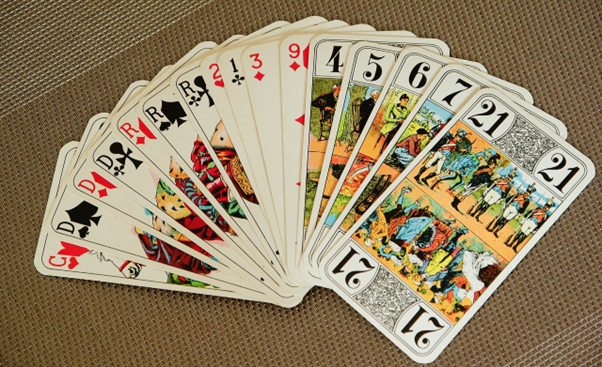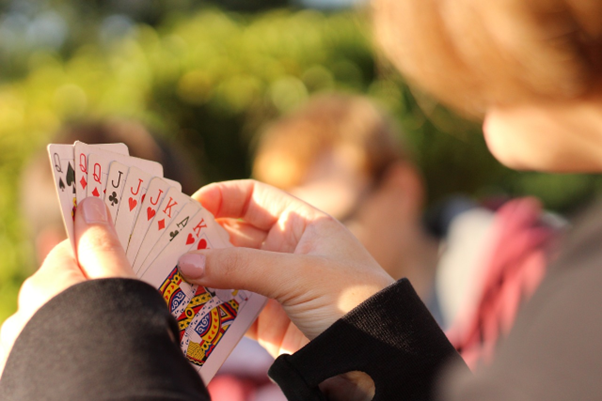There are over 1,000 card games globally. Statistically, almost 25% of adults play them frequently or sporadically. Some titles, like baccarat, are primarily games of chance since participants don’t make active decisions during the rounds. Other games, like poker, combine chance and skills and require strategic thinking. Game rules can also depend on a specific region and its traditions. Let’s delve into the history of playing cards and highlight the key facts.
Ancient Origins and Further Expansion Worldwide
Most researchers believe that the origin of playing cards dates back to China (the 9th century). During the Tang Dynasty, people adored the yezi ge game, translated as the Game of Leaves. Other scholars claim that card games have connections to domino, chess, dice, or mahjong titles. Notably, Ganifa cards appeared in India during the Mughal Empire.
Nevertheless, the earliest confirmed mention of playing cards is from 1377. A German monk described card entertainment development and the diversity of corresponding games. Between the end of the 14th century and the early 15th century, European enthusiasts decided to implement the idea of using four suits. Remarkably, tarot decks emerged in Italy during the same period. During the Colonial Era, card games were spread to America, Africa, and Asia.
Card Games from Different Regions
Poker, the most sought-after entertainment in the world, has its roots in Europe. A similar game was first mentioned in 1526; Spanish and Italian enthusiasts called it “primero.” Participants started with three hole cards and aimed to collect three or two cards of a kind or three cards of the same suit. In the 18th century, the English prototype of poker was named brag, the German one — pochspiel, and the French — poque. The modern poker version was first mentioned in 1829. Besides world-famous poker, almost every country or region can boast nationally recognized card games:
- America. Blackjack, with modern rules, has its roots in this region. Players aim to form a hand as close to 21 as possible. Each card has its value. If a gambler’s total is over 21, they lose. The croupier must draw cards until players reach at least 17. If you like this straightforward game, try your hand at Spinareel Casino. Visit the https://casinosanalyzer.com/casino-bonuses/spinareel.com page to join the best promotions and receive extra profit.
- China. Guandan is a traditional shedding-type game played by four challengers. Participants must get rid of their cards earlier than others. Interestingly, a team’s score is shown as a level in accordance with the card ranks.
- India. Kachufol is a trick-taking game with non-standard rules. Enthusiasts bet on the number of tricks they hope to win in a round. The objective is to match their bids precisely while hindering others from doing the same.
- France. Piquet is a two-player game in which opponents strive to collect more points by making combinations and winning tricks. Traditionally, the game ends when one of the gamers scores 100 points.
- Italy. Scopa is also popular in Brazil and Argentina. The goal is to capture cards from the table by matching them with cards from a player’s hand. Participants get points when collecting specific cards, clearing the table, and obtaining special combinations. The enthusiast with the highest total is declared the winner.
- Germany. Skat is a three-player, strategic trick-taking entertainment. Each participant aims to score more than half of the points.
- Spain. Chinchón is a rummy-like game for two or more participants. The goal is to form the best possible hand (three or four cards of the same suit, a sequence of cards like 4, 5, and 6 of spades, etc.).
- The United Kingdom. Cribbage is a demanded card game in Great Britain and the USA. Each of the two participants strives to collect 121 points earlier than their opponent. An exclusive scoring system with the use of a pegged board is a distinct feature of this entertainment.
We cannot but mention that the history of playing cards and various games is still debated. For instance, baccarat has roots in France and Italy. Some scientists believe that poker originated in America, not Europe. Nevertheless, these discussions reveal the same fact: card entertainment is demanded in various corners of the world, and the best games rapidly conquer new regions. Some games, like blackjack, have different rules depending on the country. In Chinese blackjack, dealers can reveal some participants’ hands selectively.
As for modern developments of playing cards, enthusiasts increasingly prefer online entertainment. Even poker tournaments are frequently held in a remote format. Beginners adore RNG-based card games in which random number generators determine each outcome. Live casinos beckon avid gamblers with dozens of baccarat, poker, and blackjack rooms where genuine croupiers broadcast the gaming process from luxurious offline studios. The best thing is that operators consistently shower their visitors with profitable bonuses to kick off gambling with extra confidence.




